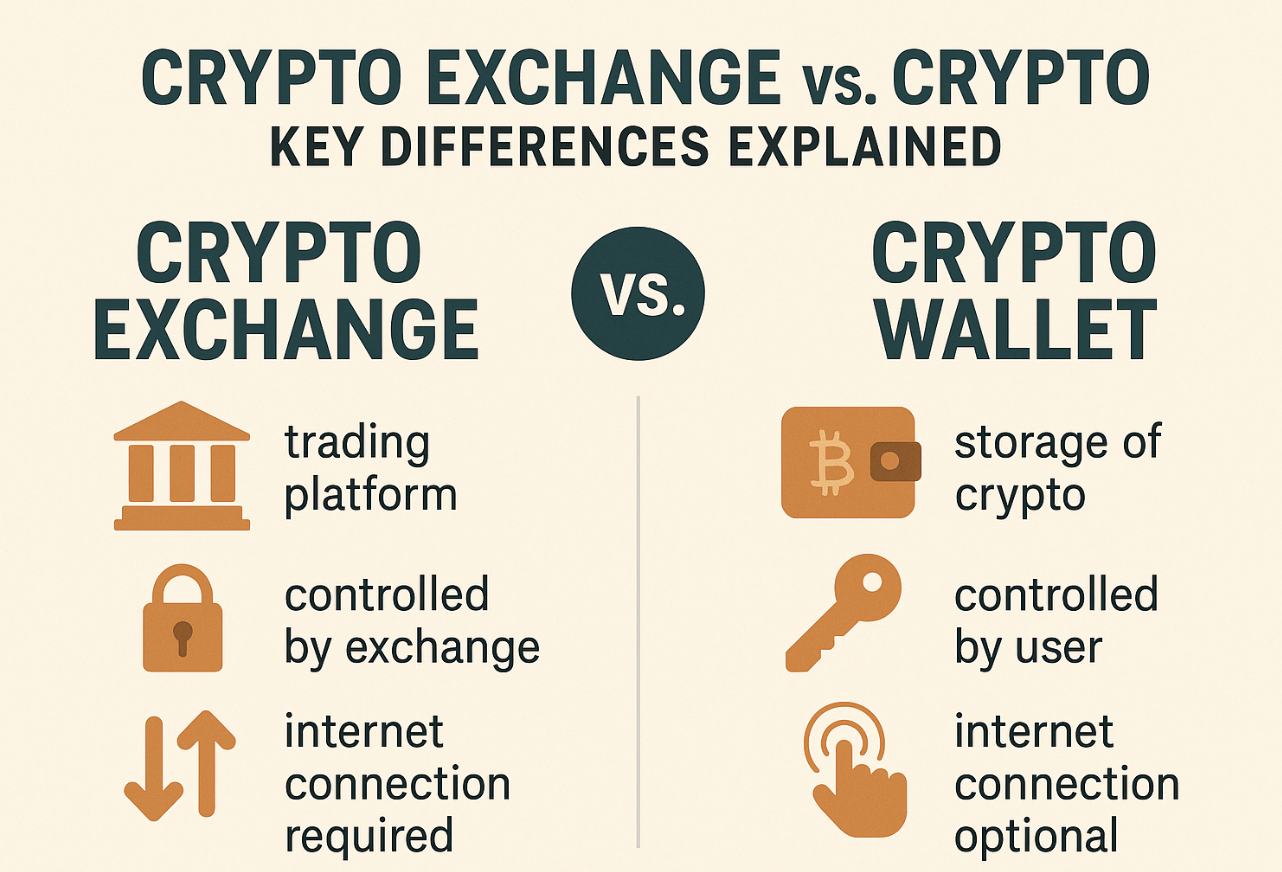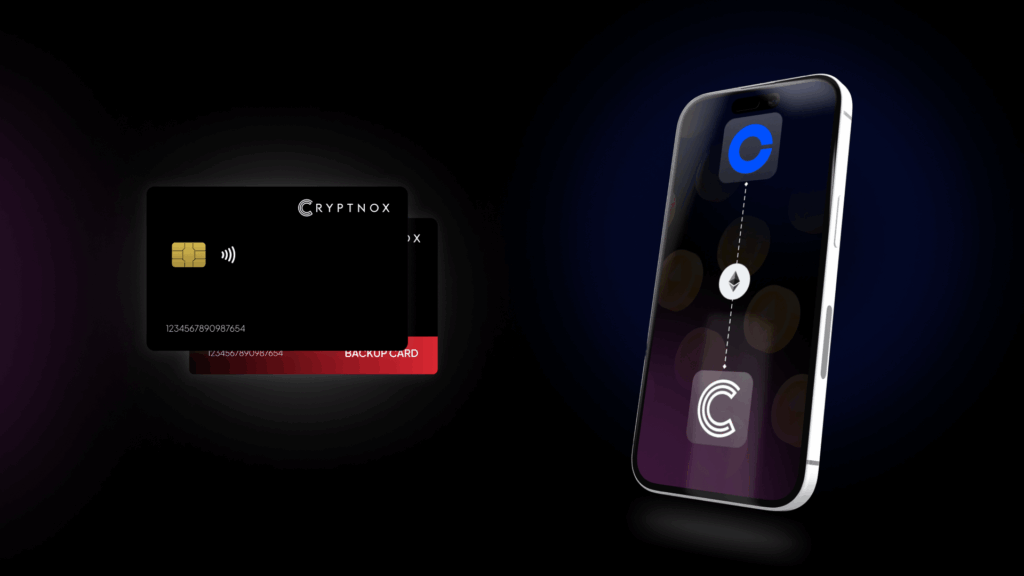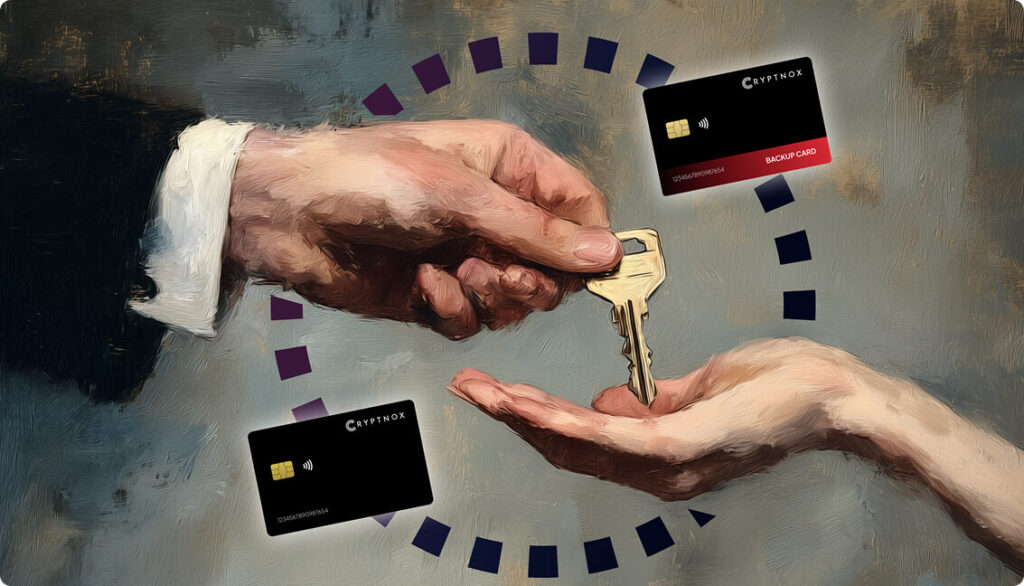If you’re searching for a simple guide to understand the main differences between a crypto exchange and a crypto wallet, you’re in the right place. Whether you’re just starting or already trading regularly, separating storage from buying and selling is the foundation for keeping your digital assets secure, accessible, and under your personal control.
What is a Crypto Exchange?
A crypto exchange is an online marketplace where users can buy, sell, and trade digital assets like Bitcoin, Ethereum, and other cryptocurrencies using money or other tokens. It’s the “storefront” for the crypto economy, giving easy access to hundreds of coins and tokens for people of all skill levels. Most exchanges also offer account management features like fiat on-ramps (ways to deposit dollars, euros, or other official currencies), tracking tools, and advanced trading options.
Exchanges make it straightforward to access and trade many different coins in real time. They’re user-friendly and flexible, often requiring an email and password to set up an account.
Functions Most Exchanges Provide:
- Buying and selling crypto instantly
- Switching between Bitcoin, Ethereum, Solana, and much more
- Market order books and advanced charts
- Staking and yield rewards for investors
- Fiat currency deposits and withdrawals
What is a Crypto Wallet?
A crypto wallet is a tool for storing, securing, and managing your digital assets. It can be software you install on your phone or computer, or a hardware device you physically own, like the advanced cards and smart wallet products offered by Cryptnox. Unlike exchanges, wallets are focused on safety and letting you control your own “private keys”, the secret codes that prove you own your crypto.
Crypto wallets empower individuals and organizations to take full control of asset security and daily management.
Core Features of Crypto Wallets:
- Hold your private keys directly (non-custodial)
- Send and receive payments on the blockchain
- Access and interact with decentralized apps (DeFi, NFT markets, etc.)
- Enhanced security, especially with hardware wallets like Cryptnox cards
- Backup options and restore capabilities
For anyone new to crypto storage, understanding What is a Hardware Wallet is and how it works can make a big difference in keeping your digital assets secure. These devices store your private keys offline, making them immune to online hacks. Learning How to use a Hardware Wallet properly ensures that your transactions stay safe and your funds remain under your complete control.
Security Risks and Benefits
Crypto Exchanges: Convenient, But Risky
Exchanges are convenient for trading but carry risks. They can be targets for hackers, face legal actions, or freeze accounts if technical problems arise. Recent history shows significant losses when platforms go offline, users may lose access to funds for months or permanently, when exchanges collapse or get hacked.
- Trading volume on exchanges topped $10.8 trillion in 2025, highlighting their popularity for asset swaps.
- However, 30% of users remain wary due to security threats and regulatory issues.
Crypto Wallets: Secure, Empowering, Flexible
With wallets, especially Hardware Wallets like those powered by Cryptnox’s EAL6+ secure element, you gain independence and much stronger protection against cyberattacks. Wallets are offline devices or software, where private keys never touch the internet, shielding them from malware, phishing, and exchange failures.
- Approximately 22-30% of the entire wallet market is now represented by cold wallets/hardware solutions, due to security concerns in 2025.
- Only device owners with the correct PIN and recovery phrase can access these wallets.
When Should You Use a Crypto Exchange?
- Need to trade, buy, or sell quickly
- Want instant access to many crypto assets
- Need to convert crypto to cash or vice versa
- Looking for advanced trading features like margin or liquidity pools
Most newcomers use exchanges because it’s simple. However, your coins are not technically “owned” by you until you send them to your wallet, so security-conscious traders always move larger holdings to personal wallets.
When Should You Use a Crypto Wallet?
- Want complete control and long-term storage
- Require direct access to DeFi apps and token interactions
- Prefer security over convenience
- Need to manage crypto for business or institutional use
Hardware wallets are the safest option for serious holders. For example, Cryptnox provides card-based wallets with EAL6+ certified chips and simple backup options for robust self-custody and authentication.
Discover Us – Cryptnox – Best Hardware Wallets
Cryptnox specializes in advanced smart card technology for blockchain applications, focusing on secure authentication and digital asset management. Their solutions cater to both consumers and businesses, offering a seamless and user-friendly experience.
Key Features and Products
– FIDO2 Smartcard: Offers secure single- or two-factor authentication with FIDO2 Level 1 certification, ideal for personal and enterprise use. It supports passwordless authentication and is compatible with various platforms like Gmail, Facebook, and more.
– Hardware Wallet: Provides secure crypto storage with a dual-card backup system, biometric authentication, and seamless Web3 integration. It supports multiple blockchain networks, including Ethereum and Bitcoin.
– For Business: Cryptnox offers White Label Crypto cards specifically designed for banks, fintech companies, and financial institutions. These customizable hardware wallet cards enable secure and user-friendly cryptocurrency management while providing full regulatory control, allowing institutions to maintain compliance and oversight over their crypto services.
Innovations and Certifications:
– Cryptnox is a member of the FIDO Alliance and their products are based on chips with certifications such as EAL6+ Common Criteria and FIPS 140-2 Level 3, ensuring high-security standards.
– Their solutions are designed for simplicity and user experience, with ongoing research into blockchain card dematerialization.
Target Audience:
Cryptnox products are designed for both individual consumers seeking secure crypto management and businesses like fintech firms and banks looking to integrate advanced security solutions into their payment ecosystems.
Crypto Wallet Adoption and Market Trends
- The crypto wallet market is projected to reach $56.74 billion by 2035 with a CAGR of 29.81%.
- 65% of digital asset users now rely on wallets for secure transactions and management.
- 42% year-over-year growth in wallet downloads, driven by mobile-first DeFi and payment adoption.
- Cold/Hardware Wallets continue to rise, hitting up to 30% of wallet market revenue in 2025.
- North America leads global wallet usage, home to 31% of all users.
Blockchain Wallet Tech: Recent Advances
Cryptnox elevates wallet technology by combining secure chip design (EAL6+), modern mobile interfaces, and a streamlined setup. Thanks to innovations in card-based self-custody and FIDO2 two-factor authentication, crypto security is both powerful and user-friendly.
- Superior User Experience: Cryptnox smartcards make secure, easy backup and recovery routine for beginners and professionals alike.
- Next-Generation Security: Advanced chips and certification standards help protect against sophisticated cyber threats, far beyond average software wallets.
Try Cryptnox’s hardware wallet solutions for your personal use or business needs. Streamline self-custody and authentication with technology trusted by the FIDO Alliance.
Which Should You Choose? Exchange or Wallet
If you plan to trade regularly and need quick access to a variety of cryptos, exchanges offer instant liquidity, fiat on-ramps, and easy-to-use interfaces. For anyone focused on security, direct ownership, and participation in DeFi, NFTs, or business management, wallets – especially hardware wallets and cards, are the right choice.
Quick Reference Table: Choosing Wallet vs Exchange
|
Use Case |
Best Choice |
Reason |
|
Quick trading |
Exchange |
Instant access, multiple coins, fiat ramps |
|
Long-term storage |
Wallet |
Security, control of keys |
|
Institutional custody |
Hardware wallet |
Advanced security, ease of use |
|
DeFi and NFTs |
Wallet |
Direct blockchain interaction |
|
Authentication/Access |
Cryptnox card |
FIDO2 two-factor, enterprise ready |
Ready for maximum crypto security? Try Cryptnox hardware wallets now!




